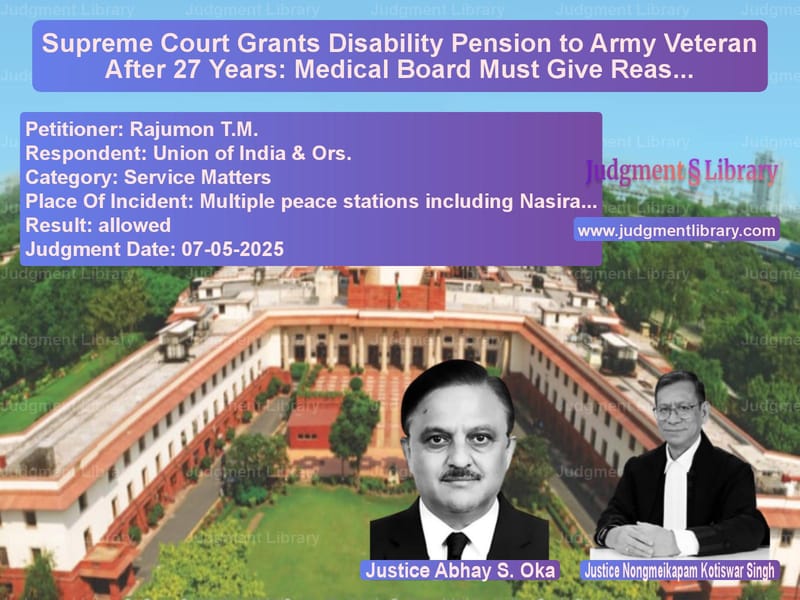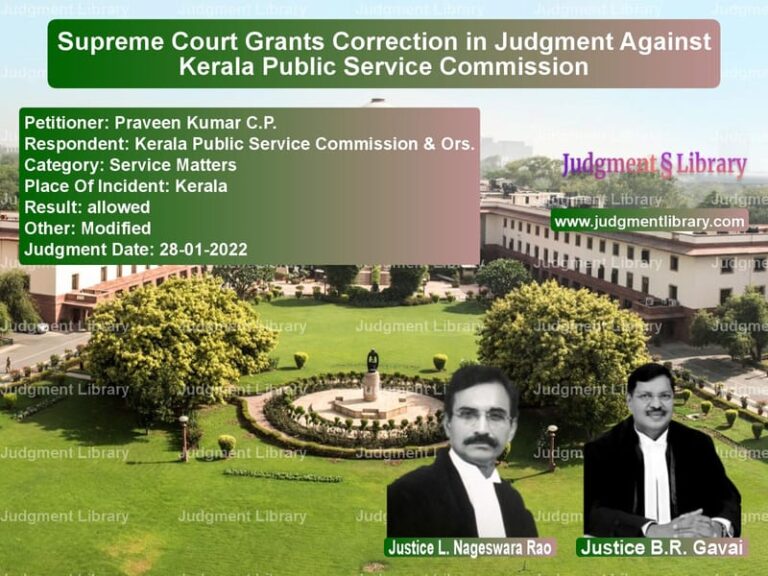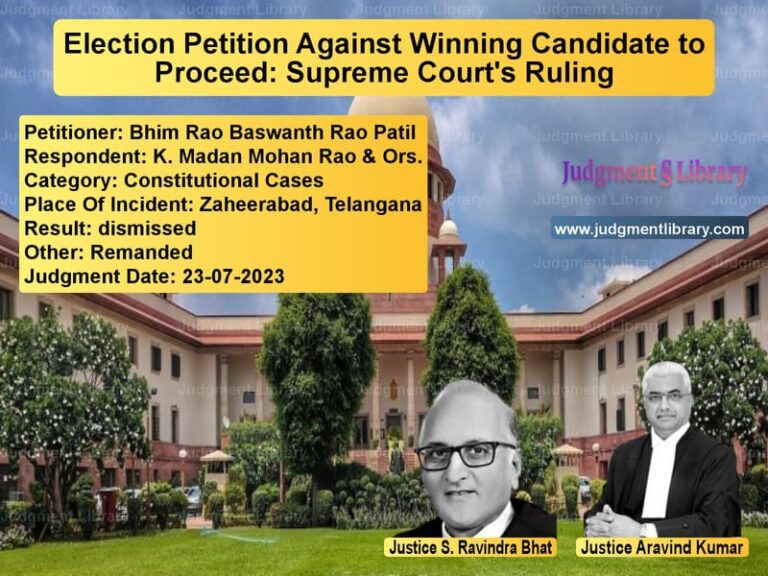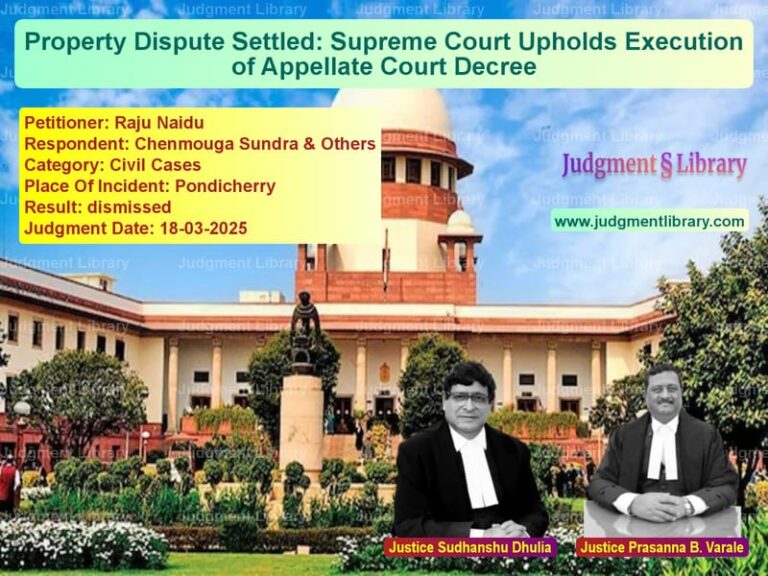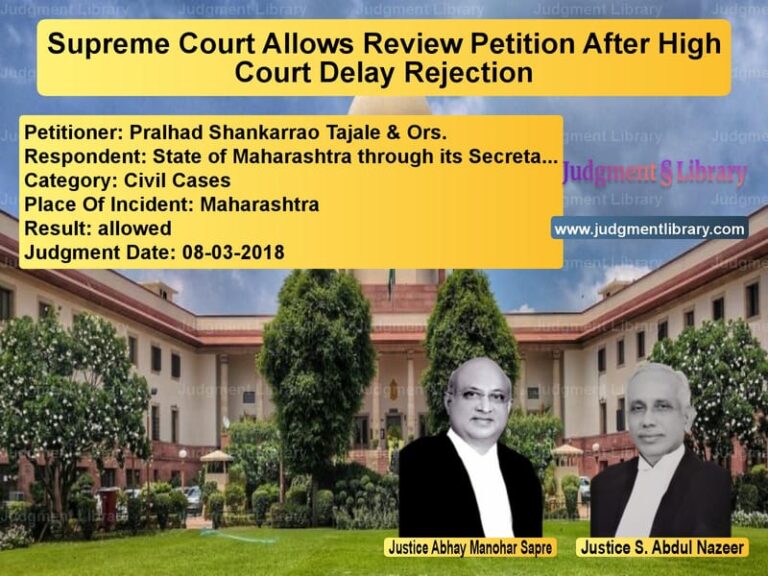Supreme Court Grants Disability Pension to Army Veteran After 27 Years: Medical Board Must Give Reasons
In a landmark judgment that brings hope to thousands of military personnel, the Supreme Court of India has granted disability pension to an Army veteran after 27 years of legal battle, establishing that Medical Boards must provide detailed reasons for their opinions when denying benefits to servicemen. The case of Rajumon T.M., who was discharged from the Indian Army in 1998 after being diagnosed with Schizophrenia, highlights the critical importance of procedural fairness in military medical assessments and the need for a compassionate approach toward soldiers suffering from mental health conditions.
The appellant, Rajumon T.M., had enrolled in the Indian Army on November 17, 1988, as a sepoy and served for more than nine years before being discharged on medical grounds. The Invalidating Medical Board held on March 30, 1998, at the Command Hospital, Western Command, Chandimandir, found that the onset of his Schizophrenia occurred in August 1993 while he was serving at a peace station. The Board concluded that the disability was “neither attributable to nor aggravated by military service” and described the disease as “constitutional in nature and not connected with the service.” Based on this opinion, the CCDA (Pension), Allahabad rejected his claim for disability pension on January 4, 1999.
What followed was a protracted legal battle that saw Rajumon approach multiple forums, including the first appellate committee and even a Member of Parliament, before finally reaching the Armed Forces Tribunal and eventually the Supreme Court. The case represents not just an individual’s struggle for justice but raises fundamental questions about the rights of military personnel and the standards required for medical assessments that determine their future benefits.
Read also: https://judgmentlibrary.com/supreme-court-upholds-teachers-appointment-in-caste-category-dispute/
The Legal Battle Begins
Before the Armed Forces Tribunal, the appellant pleaded that he had been found medically fit at the time of enrolment and nothing adverse was noted at that point of time. He argued that “the appellant became afflicted with the said disease during his service which had nothing to do with the family conditions and since the said disease developed in course of his service, he was entitled to the disability pension.”
The respondents, however, contested this claim by contending that “the appellant had been posted at peace station at the time of onset of the disease and being deployed in peace stations, and it could not have contributed to the said illness nor can the service said to have aggravated the disease, which was confirmed by the Medical Board on examination of the appellant.” They further argued that “nothing was brought on record to contradict the finding of the Medical Board and as such the claim of the appellant could not be entertained.”
The Tribunal, relying on several precedents from the Supreme Court, rejected Rajumon’s claim, observing that “the onset of the disease was in August/September 1993, during which period he was serving at Nasirabad, which is a peace station. It is also on record that the applicant had never served any operational area, high altitude or snow bound area. The Medical Board has opined that the disability of the applicant was a constitutional personality disorder. In our considered view, the disability did not occur to the applicant due to the conditions of the service.”
The Supreme Court’s Groundbreaking Analysis
The Supreme Court, comprising Justices Abhay S. Oka and Nongmeikapam Kotiswar Singh, began by acknowledging the legal principles established in previous cases but found “certain distinguishing features in the present case which persuaded us to arrive at a different conclusion from that of the Tribunal.”
The Court meticulously examined Regulation 173 of the Pension Regulations for the Army, 1961, which states that “unless otherwise specifically provided a disability pension may be granted to an individual who is invalided from service on account of a disability which is attributable to or aggravated by military service and is assessed at 20 per cent or above.”
More importantly, the Court focused on Regulation 423 of the Regulations for Medical Services for Armed Forces 1983, which provides crucial guidance on attributability to service. The Court noted that “for the purpose of determining whether the cause of a disability or death is or is not attributable to service, it is immaterial whether the cause giving rise to the disability or death occurred in an area declared to be a field service/active service area or under normal peace conditions.” This directly countered the Tribunal’s emphasis on the appellant serving in peace stations.
The Court particularly emphasized that “all evidence, both direct and circumstantial, will be taken into account and benefit of reasonable doubt, if any, will be given to the individual” and that “a disease which has led to an individual’s discharge or death will ordinarily be deemed to have arisen in service if no note of it was made at the time of the individual’s acceptance for service in the armed forces.”
The Critical Flaw in the Medical Board Proceedings
The Supreme Court’s examination of the original Medical Board records revealed what would become the cornerstone of their judgment – the complete absence of reasons in the Medical Board’s opinion. The Court observed that “the requirement to give reasons by the Medical Board is crucial, critical, decisive and necessary for the purpose of granting or denying disability pension and it is not a mere formality, but a necessary material on the basis of which the pension sanctioning authority has to decide about the grant or refusal of disability pension.”
The Court noted with concern that in Part III of the Medical Board Form AFMSF-16, where the Board is required to state fully the reasons for its opinion, no reasons had been provided at all. The Court made a crucial distinction, stating that “there is a difference between the ‘conclusion’ or ‘opinion’, and ‘reasons’ to support such a conclusion or opinion. The reasons have to be separately mentioned for the conclusion arrived at by the Medical Board. The bare conclusion arrived by the Medical Board cannot treated as the reasons for discharge of the serviceman and denial of invalid pension within the meaning of the Regulations referred to above.”
The Court held unequivocally that “if any action is taken by the authority for the discharge of a serviceman and the serviceman is denied disability pension on the basis of a report of the Medical Board wherein no reasons have been disclosed for the opinion so given, such an action of the authority will be unsustainable in law.”
Understanding Schizophrenia and Its Implications
The Court demonstrated remarkable sensitivity toward the nature of Schizophrenia, recognizing the unique challenges faced by individuals suffering from this condition. Quoting from Veer Pal Singh v. Ministry of Defence, the Court noted that “Schizophrenia is a chronic, severe, and disabling brain disorder that has affected people throughout history.”
The judgment extensively documented the symptoms and varieties of Schizophrenia, showing deep understanding of how this condition “impairs the cognitive capacity of the person, which naturally will affect the ability of the appellant to properly advance his own cause relating to the cause and circumstance of the illness before the authority.”
This understanding led the Court to conclude that “a much more liberal view ought to be adopted while dealing with the cases of discharge of servicemen from service on account of suffering from Schizophrenia as they may face several impediments and difficulties in proving the casual connection of the said disease with the military service.”
Beneficial Legislation and Liberal Interpretation
The Court emphasized that “the provisions for grant of disability pension are in the nature of a beneficial scheme intended to provide succour to servicemen in hard times who have been discharged from service after having served the nation with dedication. Accordingly, a liberal approach must be adopted while construing such beneficial provisions.”
Quoting from Maniben Maganbhai Bhariya v. Distt. Development Officer, Dahod, the Court reinforced that “when social security legislations are being interpreted, it always has to be interpreted liberally with a beneficial interpretation and has to be given the widest possible meaning which the language permits, known as beneficial interpretation. When a statute is meant for the benefit of a particular class and if a word in the statute is capable of two meanings i.e. one which would preserve the benefits and one which would not, then the former is to be adopted.”
The Burden of Proof and Procedural Fairness
The Court made a significant observation regarding the burden of proof in such cases, noting that “this is not a case where the appellant had applied for discharge of service on account of suffering from Schizophrenia. It was the authority themselves who after observing his condition decided to discharge the appellant from service after obtaining the opinion of the Medical Board. In such a situation, where the serviceman himself had not applied for discharge, but has been discharged by the authority, the onus of proving the disability and grounds of denying disability pension would lie heavily on the authority.”
The Court further reasoned that “if the decision of the authority to discharge a serviceman is based on a medical report which is devoid of reasons, which are required to be given as also mandated by rules as discussed above, such an act of the authority specially when it denies any post discharge benefit will be rendered invalid in the eyes of law.”
The Final Judgment and Relief
After comprehensive analysis, the Supreme Court concluded that “the order of discharge of the appellant and denial of disability pension to him based on a medical opinion without providing full reasons to support the opinion cannot be said to be valid.”
The Court considered whether to remit the matter to the Medical Board for fresh consideration but decided against it, noting that “adopting the aforesaid course of action at this stage after about 27 (twenty-seven) years of the appellant being invalided from service on 18.05.1998, would not be in the interest of justice.”
In a compassionate and practical resolution, the Court directed that “while we do not disturb the order of discharge of the appellant from service on the ground of medical invalidity due to Schizophrenia, we direct the respondents that the appellant be granted disability pension with immediate effect with all attending benefits, as per rules. However, the appellant will not be entitled to any arrears of invalid pension, except for the last three years.”
The Supreme Court’s judgment sets a crucial precedent that will protect the rights of countless military personnel in the future. By establishing that Medical Boards must provide reasoned opinions and that beneficial legislation should be interpreted liberally in favor of servicemen, the Court has strengthened the social security framework for those who serve the nation. The recognition of the unique challenges faced by individuals with mental health conditions, particularly in proving the connection between their service and their disability, demonstrates a progressive and humane approach to military justice.
This judgment serves as a reminder that procedural requirements, such as providing reasons for decisions, are not mere technicalities but essential safeguards that protect fundamental rights. For Rajumon T.M., the judgment brings closure to a 27-year struggle, but its implications will resonate across the armed forces, ensuring fairer treatment for all servicemen and women who develop disabilities during their service to the nation.
Petitioner Name: Rajumon T.M..Respondent Name: Union of India & Ors..Judgment By: Justice Abhay S. Oka, Justice Nongmeikapam Kotiswar Singh.Place Of Incident: Multiple peace stations including Nasirabad during military service.Judgment Date: 07-05-2025.Result: allowed.
Don’t miss out on the full details! Download the complete judgment in PDF format below and gain valuable insights instantly!
Download Judgment: rajumon-t.m.-vs-union-of-india-&-ors-supreme-court-of-india-judgment-dated-07-05-2025.pdf
Directly Download Judgment: Directly download this Judgment
See all petitions in Pension and Gratuity
See all petitions in Termination Cases
See all petitions in Public Sector Employees
See all petitions in Employment Disputes
See all petitions in Contractual Employment
See all petitions in Judgment by Abhay S. Oka
See all petitions in Judgment by N. Kotiswar Singh
See all petitions in allowed
See all petitions in supreme court of India judgments May 2025
See all petitions in 2025 judgments
See all posts in Service Matters Category
See all allowed petitions in Service Matters Category
See all Dismissed petitions in Service Matters Category
See all partially allowed petitions in Service Matters Category

